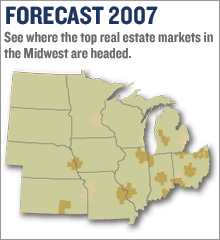6 strategies to survive the real estate bustLast year the question was whether the housing boom would slow down. Now it's how bad it will get. Fortune's Ellen Florian Kratz helps you navigate the market.NEW YORK (Fortune) -- Bret and Tricia Baird are all too aware of what they're getting into. Friends and family have admonished them to rent when they move this month to Mesa, a suburb of Phoenix, for Bret's new position as product manager with Bard Peripheral Vascular, a medical-device manufacturer. In the past few months the Bairds have been researching local real estate online and haven't liked what they've seen.
With an inventory of more than 38,000 homes for sale, up 94 percent from this time last year, Phoenix is one of the shakiest markets in the country. Nevertheless, Bret and Tricia, both 35, have decided to make a leap of faith. Mesa is Tricia's hometown, and the couple, who have four young children, are planning to live there for a while. So they just put in an offer of $400,000 for a 2,700-square-foot, five-bedroom house right next door to her sister. The place looks like a pretty good deal - 8 percent off the original asking price of $434,000 and $5,000 less than what the seller paid for it last year. But with the way things are looking in Phoenix, the Bairds realize they could be paying too much. Tricia's sister, for example, bought her house two years ago for $225,000. "We're nervous," says Tricia. "If for some reason we have to sell a couple years from now, we're not confident that we could get what we paid for it." This time last year the big question was whether the real estate market was going to slow down. Today it's "How bad will it get?" The numbers tell a confusing story. For existing homes, buyers are trickling back into the market - sales inched upward in October even as the median home price fell by 3.5 percent, the largest year-over-year drop on record. And that comes after price declines in August and September. 'Dead-cat bounce' On the new-home front, sales in October fell, but the median price crept upward. For homebuilders, cancellations are up and orders down. Last month, the White House revised its GDP forecast downward due to a housing decline that's unfolding faster than expected. "It's possible that the broader housing market will firm in the next few months, that the worst is over," says Mark Zandi, chief economist at Moody's Economy.com. "But that to me is a dead-cat bounce." In a word, yikes. So Fortune asked Zandi's group and real estate valuation company Fiserv Lending Solutions to give us their take on what lies ahead for housing in the country's 100 largest metropolitan areas. The picture, as you probably have guessed, isn't pretty. In 2007, 36 of the 100 biggest markets are expected to see price declines. For 2008 that number rises a notch to 37. The area poised for the biggest fall in 2007? Stockton, Calif., where prices are expected to drop by 7.1 percent and another 5.3 percent in 2008. If you were lucky enough to have bought a couple of years ago, the 23 percent price growth in 2004 and 30 percent in 2005 should cushion any blow. But buyer, beware. If the forecast holds true, a home purchased in Stockton today for $350,000 will be worth a mere $307,917 two years from now. And that doesn't account for the additional toll inflation can take on the true value of your asset. Next in line to take a turn for the worse: Las Vegas, where our forecasters think prices will sink 6.6 percent next year and another 8.1 percent in 2008. But let's keep all this in perspective. If you're like so many other homeowners, the value of your abode has no doubt appreciated handsomely thanks to the great American real estate bonanza. Sure, you may not be able to cash out for as much as you could have gotten last year, but we're betting you can sell it for a lot more than you would have gotten five years ago. And remember that your home is your castle, not your 401(k). It's a place to shelter your family and rest your head. So while it's wise to keep the near term in mind when making decisions, long-term perspective is what really counts in the real estate game. What to do? Whether you're buying, selling, or staying put, we've put together some simple strategies that can make a big difference for you and your home. 6 strategies to survive the bust Step away from the exotic mortgage Reporter associate Doris Burke contributed to this article. __________________________________ More from Fortune Investor's guide |
| |||||||


